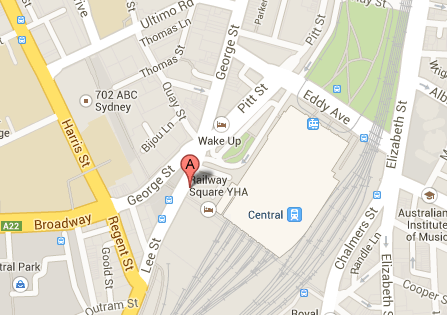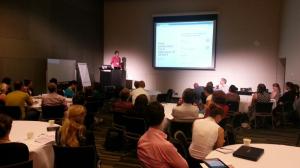The ASC offers the Unsung Hero of Australian Science Communication to honour a person (or group of people) who exemplifies science communication.
The award is intended to recognise those whose contribution has been so significant over a period of time that they should by now have been recognised.
There was an exceptionally strong field of nominees this year. The judging panel commented on the particularly high standard of applications and the excellent representation of science communication across Australia.
Craig Cormick was honoured as the 2013 Unsung Hero of Australian Science Communication for two decades of deep engagement and powerful impact across the broad spectrum of science communication.
His citation and acceptance speech (in the form of a ‘science communication rap’) are reproduced in full below.
The Unsung Hero of Australian Science Communication 2013
Winner – Craig Cormick
CRAIG CORMICK is honoured as the 2013 Unsung Hero of Australian Science Communication for two decades of deep engagement and powerful impact across the broad spectrum of science communication.
Currently Manager of National Operations, Education for the CSIRO, Craig has headed up several government science communication enterprises, including Biotechnology Australia, the Australian Office of Nanotechnology and the National Enabling Technologies Strategy within the Department of Industry. He has initiated or managed many quality science communications activities, including the education resource Biotechnology Online, and the Science and Technology Engagement Pathway (STEP) framework, and a co-convenor of the 2013 Big Science Communications Summit.
Craig has been particularly effective on developing community engagement around contentious technologies such as biotechnology and nanotechnology, but has also been involved in climate change communication. He has been active in the broader debate on science communication through contributions to Best Australian Science Writing 2012, Cosmos, Ockham’s Razor and The Conversation.
Craig largely works behind the scenes, and freely provides his time and knowledge to others. He has developed and run many cross-agency forums and working groups that allow people working in similar areas to share information and work together for common outcomes.
Craig’s biggest impact has been in demanding more evidence-based rigour in science communication practice. He has been influential in communication strategies developed by regulators, government agencies and industries working on emerging technologies. He understands that science communications must begin from the perspective of the different audiences we seek to reach, and challenges science communicators to think outside their own ‘tribe’s’ values.
Science Communication Rap
(Craig’s acceptance speech)
These are my stories. These are my mysteries. These are my histories.
These are my stories.
Why is our whole complex world of life and death and being, so beautiful yet so fierce?
From butterfly wings to cyclones?
From the cosmic to the nano?
‘Why is it so?’
What is this thing called science? Knowledge. Scientia.
Is it evolution, devolution, dilution, pollution, revolution, electrocution or institution?
Is it chemistry, brevity, industry, higher degree or zealotry?
Is it philosophy, astronomy, ecology, neurology or bureaucracy?
These are my stories.
‘Standing on the shoulders of giants, I see further – ‘
I see a ‘light in the demon-haunted darkness’
I see ‘alternative medicines that work’
I see ‘extraordinary claims requiring extraordinary evidence’
I see ‘there’s plenty of room at the bottom’
I see ‘the intellectual and practical activity encompassing the systematic stud of the structure and behaviour of the physical and natural world through observation and experimentation’
I see lots of acronyms
I see lots and lots of things written in Latin
Astra inclinant, sed non obligant – (the stars incline us, they do not bind us)
Sciential ipsa potentia est – (knowledge itself is power)
Communicare sciential ergo sum – (I communicate science therefore I am)
These are my stories.
As a science communicator I have travelled to all seven continents.
I’ve stood on volcanoes and ice caps.
Flown above the clouds and with a jet pack.
Yes, ‘I’ve been everywhere man, I’ve been everywhere’.
I’ve been to biology, geology, entomology and technology.
I’ve been to gluon, lepton, photon and proton.
I’ve been to CSIRO, DSTO, ANSTO, ipso facto.
Yes I’ve been everywhere man, I’ve been everywhere.
And I’ve listened to people tell me their tales.
What they fear and what they believe to be true.
GMOs and climate change and chemical trails.
Infant vaccination, alternative medicines and UFOs.
I’ve watched ideas be replaced by ideologies.
And I Know What I Do Is Vital!
AIK-WIDIV as an acronym
Vitae – in Latin.
These are my stories.
For ‘I f***ing love science communications’
And these are my heroes – ‘upon whose shoulders I have stood’
Robyn Williams, Carin Bondar, Carl Sagan, Peter Pockley, Derek Muller, David Ellyard, Neil Tyson, Brian Cox, Richard Attenborough, Julian Cribb – and so many others.
Not because they make science fun – or funky – or spunky,
But because they make it relevant
Because they make me want to know more, without me knowing I want to know more
Because they are as sharp as ‘Ockham’s Razor’
And as engaging as ‘Wild Sex’
And as true as ‘Veritasium’
And I know that somewhere, some place, something incredible is waiting to be known.
And I am going to tell its story.
For I Am A Science Communicator!
Ergo sum a sciential communicare – in Latin
FIAASC as an acronym.
These are my stories
THESE are my stories!


